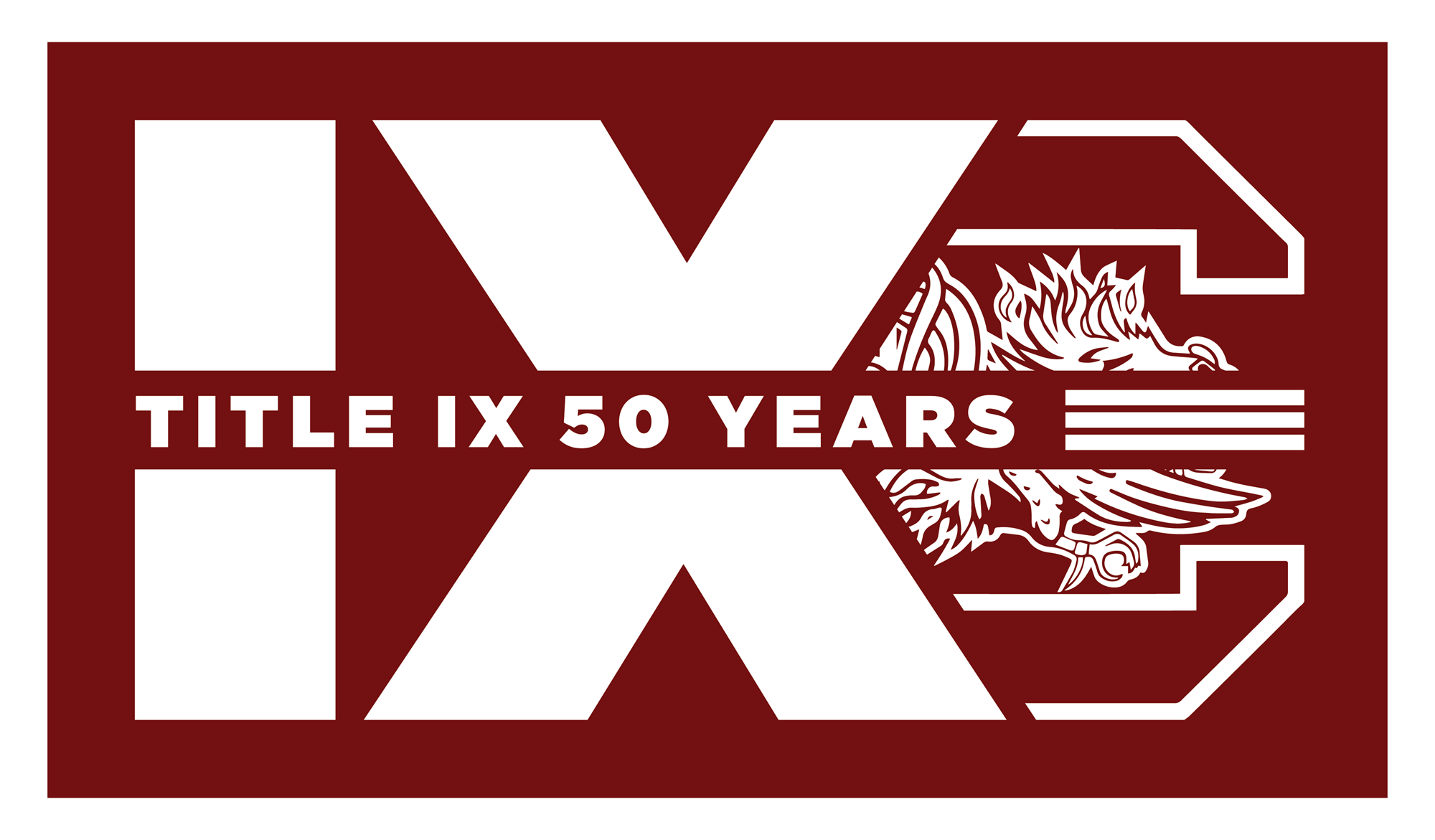
Celebrating 50 Years of Title IX
Fifty years ago, the sports world changed forever with passing of Title IX, and those changes are reflected today at the University of South Carolina with the commitment to and success of its women’s sports. The groundbreaking Title IX legislation was part of the United States Education Amendments of 1972, which states (in part):

2017 Women’s Basketball National Champions
“No person in the United States shall, on the basis of sex, be excluded from participation in, be denied the benefits of, or be subjected to discrimination under any education program or activity receiving federal financial assistance.”
Intercollegiate athletics around the country and at the University of South Carolina would be transformed, and while not all change happens quickly, it’s amazing to see how far we’ve come with still plenty of work to be done. Now, women’s athletics programs at South Carolina consistently sell out their home venues and compete at the highest level for conference and national championships in every sport. Whether it’s facilities, equipment, travel budgets, or even coaches’ salaries, South Carolina is committed to providing a championship experience for all its student-athletes.
As someone who has broadcast intercollegiate athletics for nearly 30 years, I’ve seen tremendous growth in women’s athletics here and around the country, and I can’t imagine what college sports would be like without Dawn Staley and A’ja Wilson in basketball, or coach Shelley Smith and Savannah McCaskill in soccer, or the many other outstanding coaches and student-athletes who have made Gamecock Athletics great. A walk-off home run by softball’s Krystan White in the 2018 NCAA Tournament is still one of the most memorable moments I’ve ever witnessed.
South Carolina’s female student-athletes have made an impact on the community in countless ways and have created experiences and legacies that are among the most cherished memories of many Gamecock fans.
Title IX Takes Time

South Carolina’s first 18 athletics scholarship recipients
Colleges and universities around the country were given three years to comply with the rules of Title IX. While the legislation covered a lot of issues, as it pertains to college athletics, it meant that women deserved an equal opportunity to be student-athletes and have an equal experience to their male counterparts. That included equipment, supplies, travel, and scholarships. The money for these scholarships came from the Gamecock Club, which was the same source that provided scholarships for male student-athletes.
Women’s athletics teams at South Carolina officially became part of the athletics department in January 1974 with a total budget for the existing women’s programs set at $41,000. In March of that year, the nickname “Chicks” was adopted for the female athletics teams. The NCAA did not sponsor women’s athletics at the time, so the teams fell under the auspices of the Association of Intercollegiate Athletics for Women (AIAW).
Several of the women’s teams found immediate success. South Carolina won its first state championships in women’s basketball and gymnastics that year, and the softball team competed in the Women’s College World Series in 1976.
In 1975 South Carolina had 18 scholarships available for female student-athletes, with three going to each of the six sports (Women’s golf was the seventh original sport but was dropped from the program that year).
The scholarship allotment increased to five per team in 1977, which is also when the women’s team’s nickname was changed to “Lady Gamecocks.” The South Carolina women’s programs later dropped “Lady” from the nickname and all of South Carolina’s athletics teams are now known as Gamecocks.
Watch Us Play
As the years have passed, South Carolina has enjoyed a great history of success in women’s athletics, and the last decade has shown that the Gamecocks can achieve at the highest levels in any sport.
The Gamecock women’s basketball team is ranked No. 1 nationally, won the National Championship in 2017, was ranked No. 1 in the nation at the end of the 2020 season (when the postseason was cancelled due to the emerging COVID-19 pandemic), and has been to three NCAA Final Fours since 2015. The Gamecocks have led the nation in attendance for the last eight seasons.

The women’s soccer team also regularly ranks among the top nationally in attendance and has reached the NCAA Elite Eight four times since 2014, including its first College Cup (Final Four) appearance in 2017.
The softball team enjoyed great success throughout its history, including eight trips to the AIAW and Women’s College World Series in the 1970s, ’80s, and ’90s, and more recently, the team has reached seven of the last eight NCAA Tournaments.
Since 2005, the equestrian team has won three Overall National Championships as well as three consecutive Hunter Seat National Championships, while the women’s track and field program won the 2002 NCAA Outdoor Team National Championship and many individual national championships.
In the last 15 years, the women’s golf team has won five NCAA Regional Tournament and reached the NCAA Championships 10 times. The Gamecocks were also ranked No. 1 nationally for much of last season.
The women’s tennis team is also consistently ranked in the top 25 nationally and has made the NCAA Tournament every year since 1994, while the volleyball team has recently found a resurgence and has reached the NCAA Tournament in three of the last four seasons. Beach Volleyball was added in 2013 and after becoming a NCAA Championship-sponsored sport in 2016, the Gamecocks have reached the postseason twice and earned several national rankings.
Many former Gamecocks have gone on to compete in the Olympics and play professionally in their respective sports, whether it’s in the WNBA, NWSL, LPGA Tour, or one of many other professional leagues in the United States and overseas.
In some ways, the fight for equality in women’s sports continues today, but now more than ever, there is history and a platform that commands attention and respect.












